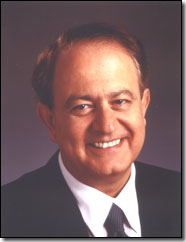
2005 IEEE International Conference on Acoustics, Speech, and Signal Processing
March 18-23, 2005 • Pennsylvania Convention Center/Marriott Hotel • Philadelphia, PA, USA
ICASSP
30th Anniversary
Can Hollywood Survive in the Digital Age?
Date: Sunday, March 20, 13:00 - 14:00
Location: Exhibit Hall C
Presented by
Prof. C. L. Nikias, University of Southern California
Abstract
In the rapidly converging digital worlds of movies, television and the Internet, Hollywood and the entertainment industry face their greatest technological challenge ever: How to make the most of the new digital production and distribution possibilities. A past generation of technologies gave birth to today’s major studios and huge production companies. Technology today is democratizing power that previously belonged to only a few moguls.
Today, anyone with a digital camera and digital smarts can make a movie. Tomorrow, anyone connected to the next-generation Internet will be able to seamlessly distribute that movie to a huge audience. For a century, Hollywood’s massive studio system has mastered communication technologies to prosper massively in sunny California’s economic warmth. But new digital technologies are rapidly empowering bold entrepreneurial and independent filmmakers. They can make and distribute their movies from anywhere in the world. If the Hollywood studios are going to survive, they must quickly master new digital technologies that are already profoundly changing our lives. Data delivery speeds are approaching a critical mass that will immerse vast audiences in unimaginably rich, immersive entertainment experiences.
Nikias predicts video rental stores and home stacks of CDs, DVDs and laser discs will all disappear. People will experience movies, concerts and a variety of other entertainment economically produced and delivered over the Internet to superb, affordable home theaters. Meanwhile, real theaters won’t go away and could flourish. He doesn’t predict who will win in the new digital entertainment economy, but he’s rooting for Hollywood.
Speaker Biography
 As Dean of the University of Southern California’s Viterbi School of
Engineering, Dr. Nikias leads a School that is consistently ranked among the
top ten Engineering Schools in the United States. He became Dean of the School
on July 1, 2001. He is also the holder of the Z. A. Kaprielian Chair in
Engineering.
As Dean of the University of Southern California’s Viterbi School of
Engineering, Dr. Nikias leads a School that is consistently ranked among the
top ten Engineering Schools in the United States. He became Dean of the School
on July 1, 2001. He is also the holder of the Z. A. Kaprielian Chair in
Engineering.
The USC Viterbi School of Engineering is the home of the Information Sciences Institute; the Department of Homeland Security’s first Research Center of Excellence; the National Science Foundation (NSF) Engineering Research Center (ERC) on integrated media systems; and, the NSF ERC on biomimetic electronic systems. Dr. Nikias was the founding Director of the NSF ERC on integrated media systems from 1996 to 2001.
His research interests include statistical signal processing with applications to integrated media systems, digital communications, radar and sonar and biomedical signal analysis. He is the author of more than 100 published journal papers, 180 conference papers, 3 textbooks and 8 patents. He has mentored 22 Ph.D. students. He has consulted extensively for the Department of Defense and the U.S. Government during the past 20 years.
Dr. Nikias is a Fellow of the Institute of Electrical and Electronics Engineers (IEEE) and a Fellow of the California Council on Science and Technology (CCST). Three of the publications he co-authored received research paper awards: IEEE Signal Processing Best Paper Award, “Fred W. Ellersick Award of Outstanding Unclassified Paper at Military Communications, and the IEE A H Reeves Premium Award. In January 2000, the California Governor formally commended Dr. Nikias for helping California successfully meet the challenge of the new millennium through cutting-edge research. He is a foreign member of the Russian Academy of Natural Science. He is a member of Phi Kappa Phi.
Dr. Nikias serves as a member of the Board of Directors of the Lord Foundation of California; the Alfred Mann Institute for Biomedical Engineering; and, a member of the Board of Trustees of the Chadwick School, an independent school in Palos Verdes Peninsula, CA.
Dr. Nikias received a Diploma in Electrical and Mechanical Engineering from the National Technical University of Athens, Greece. For his graduate studies in electrical engineering, he attended the State University of New York at Buffalo, earning a Master of Science and a Doctor of Philosophy. He is the recipient of an Honorary Doctorate from the University of Cyprus.